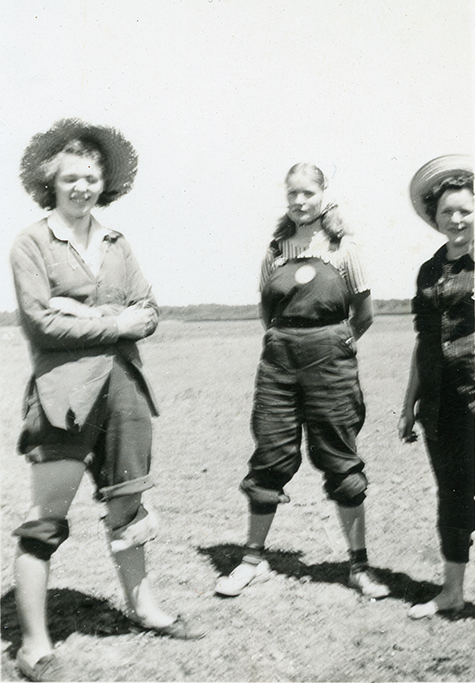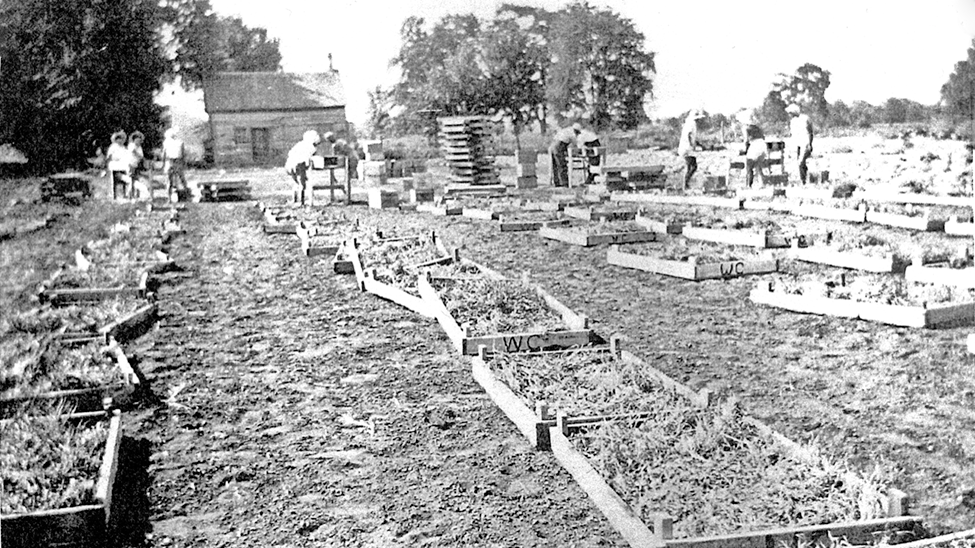Mary Gardner
1944, 1945, Thedford
My unforgettable adventure as an Ontario Farmerette began one day in June 1944 at my Toronto collegiate.
A very persuasive gentleman explained to us students that with our young men at war Ontario needed replacement workers for the orchards and farms. As Farmerettes, we would be committed to thirteen weeks of work wherever we were sent and as Farmerettes we would be excused from writing our grade thirteen final exams!!
So fired by pure patriotism, three classmates and I, complete strangers to agriculture, arrived for a season's work in Thedford Ontario. Our wardrobe consisted of brand new Levis. In the 1940's blue jeans were not an all-season all-occasion outfit, but strictly a uniform for work!
As if by magic, good clean comfortable accommodation was provided in schools, barns and storage buildings throughout rural Ontario. Ours was ideal - a large two-storied old mill transformed into a dorm with a spacious kitchen-dining-room-rec hall nearby. This establishment was run efficiently, like a summer camp with a camp mother, labour supervisor and kitchen staff, many of them from Ontario Y's, pleasant and wise in dealing with a group of spirited teenagers from all over Ontario.
As typical teenagers we made constant comparisons. Some of us worked for regular Simon Legrees (actually the exception) with no patience and no intention of giving us extra breaks in the summer heat. Others worked for kindly father-figures who arranged heavenly swim breaks in clear ponds and feeds of cold watermelon in the fields.
And of course there were rumours of farmers' daughters, fresh and crisp in summer organdy, sitting at the town soda fountain when we were returningfrom the fields hot, tired and dirty in the back of a truck. And how we envied our schoolmates working in the beautiful orchards of Niagara or even in fields of carrots.
We worked in the onion bogs in ground baked by the sun to cement, on hands and knees, weeding. Still, we accepted the luck of the draw cheerfully and faced the Farmerettes' challenges which were:
Boredom - We conquered it by telling each other in detail every movie we had ever seen as we crawled up and down the endless onion rows.
Raw knees - You wouldn't believe what we used as knee-pads until our mothers in distant Toronto put aside their many League knitting projects to make us indestructible knee protectors.
The Clinging Aroma of Onions - We used every soap and lotion available with no success. To this day, Jergens Lotion smells to me of onions.
Back at our bunk-house, we put Farmerette words to Hit Parade tunes.
One snippet I still remember, set to the tune of a Carmen Miranda hit:
I yi, I yi
Have you ever weeded in the onions?
With that achy-breaky like
Kinda snaky-like
Thedford farmerette crawl!
I never heard a complaint about the camps' financial arrangements. We were paid, I think, twenty-five cents per hour for a ten-hour day. From this sum we paid a small amount for room and board. Needless to say, we considered working as a Farmerette to be a wartime volunteer contribution.
But it wasn't all work. There was free time every evening for recreation, letter-writing, record playing (TV didn't exist) and trips to town. Our camp mother had wisely declared our camp out of bounds to nearby Camp Ipperwash. The social highlight of the summer was the Planter's Picnic when our farmer-employers acted as hosts bringing their families and food - and what a feast - roasted corn and wieners (Pizza didn't exist), watermelons and home-made pies to die for.
We Farmerettes provided the entertainment -Songs, dances and saucy skits about farms. It was the greatest party. The only drawback came in the wee small hours when exhausted Farmerettes climbed the bunk-house stairs ready to tumble into bed only to discover some of the farmers’ wives had tucked their soundly sleeping babies into our beds.
The following summer of 1945 my friend and I joined the Farmerette organization again, this time as kitchen staff preparing and serving meals and cleaning facilities indoors and out. Our residence was a converted storehouse in an old apple orchard and our daytime adventures centered on the chasing and catching of rats. Believe me I had the snapshots as proof.
I remember vividly one quiet summer afternoon peeling carrots in the kitchen behind a high serving counter. I heard a clanking sound beside me, saw a tall lean rat standing on his haunches drinking out of our water pail and evidently, they tell me, I cleared the high counter in a leap that would have qualified me for the post-war Olympics.
Nor was that my only notable accomplishment of the summer. Every day we faithfully scrubbed our buildings, indoors and out. Our work was duly inspected by a traveling lady supervisor and she presented us with a certificate awarded for "the sweetest smelling johns in Southern Ontario."
The benefits of Farmeretting were obvious - girls from all over the province met, worked together and made friends. Ontario's garden food supply was maintained, onions and all. Because of the good food, exercise and long days outdoors, I have never been healthier - and what a sense of accomplishment!
Even though to this day, Jergens Lotion smells to me like onions, let’s face it, how many Ontarians do you know who have won an award "for the sweetest smelling johns in Southern Ontario?"
Reprinted with permission from “Two Summers as a Farmerette” by Mary Gardener, A1996.89 Farmerettes: Wellington County Historical Society Essays, 1996, held at the Wellington County Museum and Archives.
Walt Carrothers Onion Harvest.




 Subscribe to this page
Subscribe to this page